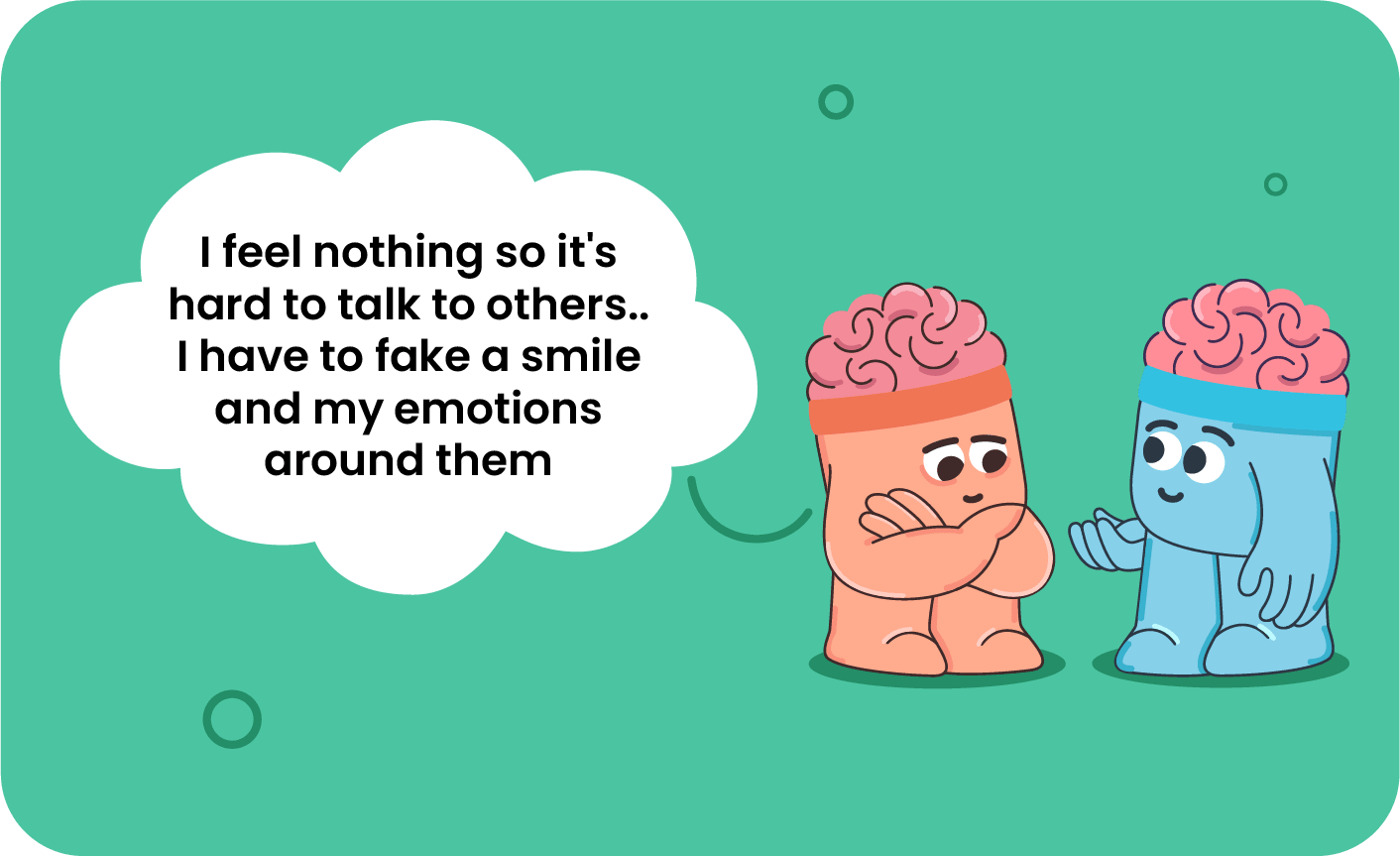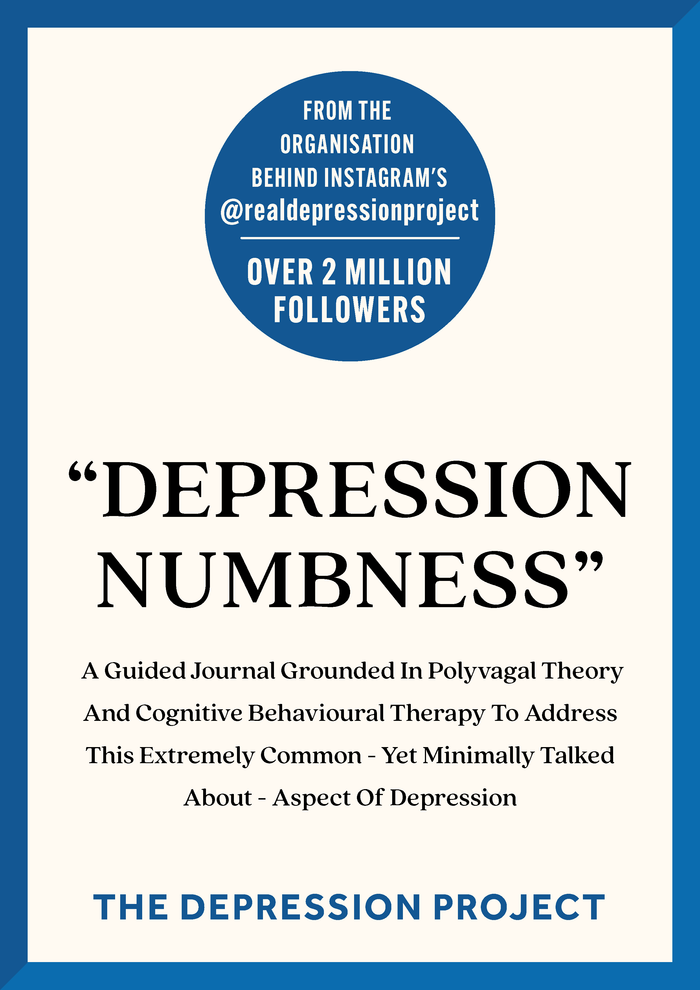Unfortunately, when you're fighting depression, it's really common to at times feel numb.
And, in order to help you feel understood and that you are not alone, right now, we'd like to share with you a free excerpt from our "Depression Numbness" Journal that includes a variety of quotes about what "depression numbness" feels like, looks like and sounds like - as told to us by members of The Depression Project's community.
What Does “Depression Numbness” Feel Like?
“When you’re ‘depression numb’, you’re indifferent to everything and everyone”
As this quote from one of our members gets at, apathy is one of the hallmarks of “depression numbness”. On a similar note, another one of our members put it this way: “When I’m numb from depression, I just don’t care. No matter what happens or what I do – good or bad – it’s just a blah ‘I don't care’. Stubbed my toe? I don't care. Broke a ceramic dish? I don't care. Need to wash the dishes? I don't care. Found $20 in a jacket pocket? I don't care.”
According to our community, it’s also important to note that when you’re feeling “depression numb”, it’s extremely common to no longer enjoy the hobbies and activities that you used to love. Not only that, but it’s also extremely common for the people closest to you to no longer bring you any joy, pleasure or happiness, either. Instead of positive emotions such as these, you feel nothing. And, understandably, this can leave you confused, scared, and completely disconnected from the world – since nothing evokes in you any sort of emotion.
“When you’re ‘depression numb’, there’s no colour in anything”
Emotions have the power to make every experience seem vibrant and colourful. So, when you’re experiencing “depression numbness”, it’s like seeing everything in black and white. All of the colour and beauty has vanished.
“‘Depression numbness’ makes you lose touch with your senses, and makes you feel like you’re outside your body”
When you’re struggling with “depression numbness”, you may feel as if your senses are blunt. Consequently, things that would otherwise stimulate your senses or cause a sensory reaction in some way – such as food, music, art or sex, for example – may be much less able to do so. Additionally, when you’re “depression numb”, it’s extremely common to feel as if you’ve left your body – in the sense that you’re no longer present in it (this is known as being disembodied).
“When you’re ‘depression numb’, you’re constantly fatigued”
Feeling “depression numb” can coincide with your body “shutting down”. And, if this is the case, then for as long as your body is “shut down”, you may experience constant, debilitating fatigue – to such an extent that even relatively simple tasks like doing your chores or taking care of your personal hygiene for example can feel like climbing a mountain.
“When you’re ‘depression numb’, you have no motivation”
When you can no longer find pleasure in anything, then it can rob you of all your motivation. In particular, it’s common to find yourself thinking “what’s the point?”, and to feel as if you’re devoid of purpose. Furthermore, this lack of motivation is likely to be compounded if you’re feeling extremely fatigued.
“When you’re ‘depression numb’, everything is stagnant”
Everything can feel very slow and heavy when you’re struggling with “depression numbness”. It may seem as if you’re not able to gain any momentum, develop, or grow at all. There may be nothing in the present or the future that excites you or that arouses any joy, and life can feel as if it’s reduced to constant nothingness.
“Being ‘depression numb’ feels like you’re operating on auto-pilot”
You may just be going through the motions, doing the bare minimum every day to survive. The absence of emotions can make you feel like a robot.
“‘Depression numbness’ is the absence of hope”
It’s common to be so far removed from positive emotions such as joy, happiness, pleasure and being at peace for example that it can be hard to envision yourself ever experiencing them again. Similarly, it can feel impossible to envision yourself ever being free of depression as well.
Now That We’ve Shared What “Depression Numbness” Feels Like, What Does It Look Like?
“Inactivity”
Like we’ve said, when you’re “depression numb”, it’s extremely common to feel fatigued and to lack motivation. Consequently, inactivity is also extremely common, and can take the form of, for example:
- Not leaving your home to do the things that you otherwise would;
- Constantly putting off attending to your to-do list;
- Forgoing basic tasks such as doing your chores or looking after your personal hygiene;
- Spending much more time in bed than you otherwise would.
“When you’re ‘depression numb’, it’s such a struggle to engage with the world around you”
This is commonly because:
- When you’re “depression numb”, everything tends to slow down for you. However, while you slow down, the world keeps going at its regular pace – which means that when you attempt to engage in the world, everything may seem too busy and fast for you to comprehend.
- Your senses are part of how you engage with the world around you, and like we’ve said, when you’re “depression numb”, you may find that your senses aren’t as sharp as they otherwise would be.
- If you aren’t able to feel any emotions yourself and it seems as if everybody else around you can, then it may not seem possible for you to be able to relate to anyone.
“I have to fake a smile and my emotions around others”
Like we’ve repeated, when you’re “depression numb”, you’re likely devoid of emotions – and consequently, it’s highly unlikely that you’ll feel the natural urge to smile. However, if you happen to be around others, then you may feel compelled to fake a smile. This may be because, for example:
- You’re scared of being judged;
- You fear that you’ll burden others if you let them know how you’re really feeling;
- You’re scared that no-one will understand what you’re going through;
- You feel that talking and acting in a way that’s aligned with how you actually feel wouldn’t be socially acceptable.
For these reasons, masking your true feelings in front of others when you’re “depression numb” is something that a lot of our community’s members can relate to. As one person in particular put it: “I have to make a conscious effort to express appropriate emotional responses for the sake of others, rather than simply not reacting at all because that is how I honestly feel”.
“When I’m feeling “depression numb”, I sometimes struggle to respond to other people during a conversation and can’t find my words”
Feelings and emotions play a role in helping you communicate with other people. Consequently, when you’re experiencing “depression numbness” and are completely out of touch with your own feelings and those of others, then communication can become difficult and stunted.
“If I’m not up to faking a smile and interacting with others, then I isolate myself”
At times, you may simply feel too numb to be able to fake a smile and pretend that everything is fine. When this is the case, then you may feel compelled to socially withdraw until you feel better.
“When I’m “depression numb”, I can’t think clearly at all”
According to our community, when experiencing “depression numbness”, it’s also common to experience “brain fog”. This can mean that you find it difficult to, for example, think clearly, concentrate, make decisions, react quickly, and/or remember things.
“Even though I try, I just can’t cry”
When you’re “depression numb”, genuine expressions of emotion can be rare or non-existent. After all, how can you express your emotions if you’re currently numb to feeling them? This explains why when you’re “depression numb”, you may not be able to cry no matter how much you want to.
“I self-harm just to feel alive”
Particularly if you’ve been “depression numb” for an extended period of time, you may find yourself desperate just to feel anything – which can explain why some of our community members report that they’re prone to self-harming when they’re “depression numb”. However, it’s important to note that while harming yourself can help you to break out of “depression numbness”, it’s a very destructive and self-sabotaging way of doing so, and instead, you’re much better off using one or more of the strategies we’ll share with you in this journal (at this link, you’ll also find a list of crisis support numbers that you may be able to call if you feel the urge to self-harm as well).
Lastly, Now That We’ve Shared What “Depression Numbness” Looks Like, What Does It Sound Like?
“What’s the point?”
Like we’ve said, if you’re no longer able to feel joy in anything, then everything can feel like it’s pointless. As we’ve also touched upon, this apathy can extend to not just items on your to-do list, but also relatively simple, basic tasks that you would otherwise do – such as looking after your personal hygiene or doing your chores, for example.
“Nothing’s ever going to change”
Like we’ve also said, for some people, “depression numbness” can include the absence of hope.
“I miss who I used to be”
This is a common thought to have if you find yourself looking back on better times when you were able to feel positive emotions such as joy, hope, love and happiness, for example.
“I could be doing so much, but I don’t”
Like we’ve said, “depression numbness” often goes hand-in-hand with inactivity, and if this is the case, then you may find yourself lamenting all that you would be able to do if you weren’t feeling so numb. This self-talk may also become highly critical in nature, and take the form of blaming and abusing yourself for not being better able to function.
“No thoughts at all”
Alternatively, you may find that when you’re “depression numb”, you actually experience an absence of not just emotions, but also thoughts.
End of free excerpt
If you can relate to some or all of the above journal excerpt, our friend, then like we've said, please rest assured that you are NOT alone, and that feeling numb when you have depression is extremely understandable given everything you're going through.
All our love,
The Depression Project Team.
P.S. In addition to helping you feel as if you're not alone, we created The "Depression Numbness" Journal in order to:
- Help you better understand “depression numbness” – including the reasons why you may be experiencing it in the first place;
- Help you break out of “depression numbness” - so that you can get back to experiencing joy and pleasure from the things that you usually like doing, be able to think clearer and function more effectively, and be in a better position to take the necessary steps to treat your depression.


